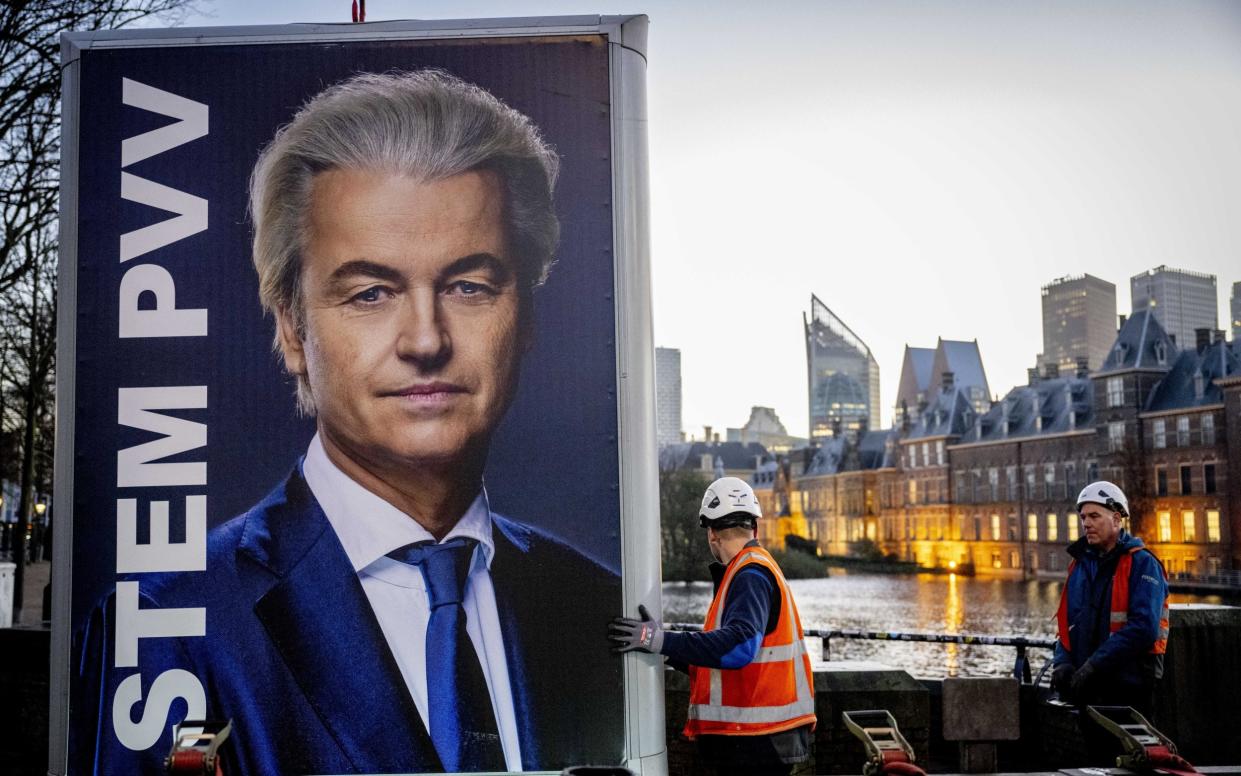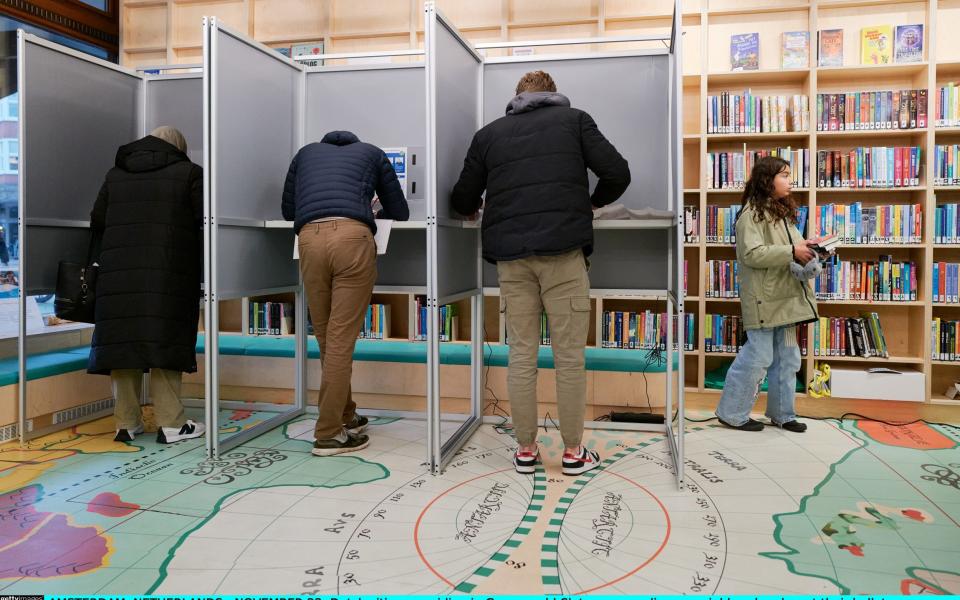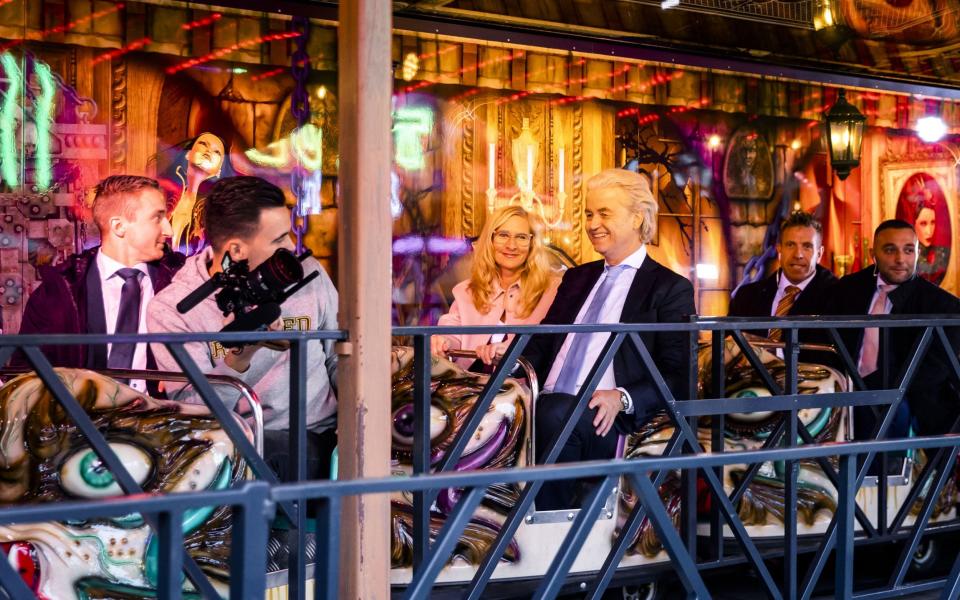Geert Wilders is just the latest example of how British people misunderstand the Dutch

- Oops!Something went wrong.Please try again later.
Laid-back, pot-smoking, sex-loving, cycling, recycling liberals. Like all caricatures of a people, our notion of what the Dutch are like is, at best, a sweeping generalisation. Or maybe a misapprehension, engendered by the country’s comparatively liberal approach to certain activities.
But Amsterdam, with its coffee shops and brothels, is not the Netherlands. And as this week’s shock election victory of far-Right, anti-Islam populist Geert Wilders illustrates, a significant proportion of the Dutch are far less liberal about some things than we might fondly (or lazily) imagine.
Wilders’s Freedom Party has secured 37 seats in the 150-seat Dutch parliament in the country’s general election, making it the biggest winner. While coalition talks may take some time, the silvery blond-maned Wilders, 60, has his sights set on becoming prime minister, replacing the conservative Mark Rutte.
Wilders, who insists he is not far-Right, swept in on a platform of anti-immigration, anti-asylum rhetoric, albeit dampened down a little to appeal to more mainstream voters.

“The Netherlands can’t take it anymore,” he told voters. “We have to think about our own people first now. Borders closed. Zero asylum-seekers.”
If he says he’s put his manifesto plans to ban the Koran and mosques on ice, this is hardly likely to provide much reassurance to the country’s Muslims, who make up about five per cent of the population.
So how, in the European country we associate with a gentle, progressive lifestyle and outlook, did this seismic political result come to pass? Is the Netherlands of the British imagination merely a chimera?
The first mistake is assuming a uniformity of values across the country. Recent years have instead seen a growing split between urban and rural communities.
“The urban-rural divide has been a big issue in the last year or two,” agrees Ben Coates, author of Why the Dutch are Different: A Journey into the Hidden Heart of the Netherlands. The Dutch farmers’ party, the BBB, performed well in regional elections in March. Their promise to fight government plans to slash nitrogen emissions by limiting livestock numbers and buying out thousands of farms appealed to rural voters. In a sign of the country’s divide on environmental issues, the Greens also did well in those elections.
But while the story of the urban-rural divide may give the lie to the idea that everyone’s out there fixing solar panels to their lovely Dutch homes, it doesn’t explain the general election result. Support for Wilders spanned both rural and urban areas.
“There’s no statistically significant difference [between urban and rural Freedom Party voter numbers],” says Dr Koen Damhuis, a political scientist at Utrecht University and author of Roads to the Radical Right. What unites them is the anti-immigrant sentiment Wilders stokes and weaponises. What divides them is their reasons for buying into it.
“Some have the impression, when it comes to healthcare and social housing, that migrants get preferential treatment,” says Dr Damhuis. “There’s a deep sentiment of injustice.
“Others say, ‘It’s not that I receive too little, it’s that I give too much [in taxes]’. Others [still] are more concerned about cultural values: defending gay marriage and the position of women. They tend to be more economically privileged.”
Wilders’ appeal to the latter group isn’t as contradictory as it sounds in Britain, where socially liberal attitudes and opposition to immigration are less likely bedfellows. Wilders may be of the far-Right, but his position on gay marriage and women’s rights is liberal. His stance has been that these values need defending against more conservative Islamic ones. “Even parties that are quite rightwing [in the Netherlands], like Wilders’, are still quite liberal on social issues,” says Coates.
While their rhetoric on law and order and crime is typically tough, there’s “no mention of abortion or capital punishment,” says Coates. “Wilders is not trying to upend Dutch society; he’s [talking about] trying to protect the liberalism Dutch people currently enjoy. He’s pro-gay and women’s rights and doesn’t want to see immigration from Muslim countries undermining that. He’d see it as intolerance of intolerance.”

This isn’t to say the Netherlands’ fabled tolerance hasn’t been tested of late. The flipside of its famously liberal approach to soft drugs and prostitution has been the indecorous stag-do hordes in Amsterdam, which the city has more recently tried to discourage. There’s also the organised crime, which led to the alarmist BBC headline in 2019: “Is the Netherlands becoming a narco-state?”
“We definitely have the characteristics of a narco-state,” Jan Struijs, chairman of the country’s largest police union told the broadcaster.
More reassuring perhaps was the Dutch National Institute for Public Health and the Environment’s advice to a locked-down country during the pandemic in May 2020: acknowledging the toll social distancing would take on single people, it suggested they find a seksbuddy – or sex buddy.
But not everyone in the Netherlands, of course, is sex and drugs-positive. “A lot of people come to Amsterdam for a weekend, have fun, smoke a joint, take some mushrooms and assume the rest of the country is like that,” says Coates. “People see it as Woodstock writ large, where everyone is happy and relaxed, [everyone] cycles and recycles and smokes weed; but in some ways it’s a fairly religious country where a lot of the old Protestant and Catholic values play quite strongly.”
About a fifth of the population is Catholic, while about 15 per cent are Protestant. While immigration increased last year, with around 403,000 people moving to the Netherlands (almost 150,600 more than in 2021), the majority (64 per cent) had a European background.
Wilders, who has been in national politics for 25 years, hasn’t succeeded by promising to clamp down on the country’s socially liberal ways – but it may be that these ways have blinded some on the outside to the undercurrent of anti-immigration feeling that’s existed for some time.
“This isn’t new,” says Dr Damhuis. The potential for a far-Right victory like this has been there a while, he believes. It has now been realised because of a space that opened in the political landscape. Rutte’s government collapsed in July amid a row over asylum policies among the ruling coalition parties. With the issue of immigration to the fore, and dissatisfaction with government at a high, the stage was set for a populist surge.
“This was a political opportunity for people like [Wilders] to say, ‘Enough is enough, we should put the Dutch first,” says Dr Damhuis. “For a lot of Dutch voters, it’s intuitive that there should be some control in terms of who we accept.”
According to the Financial Times, Wilders even appealed to the Dutch youth, winning the most votes of any party in the 18-35 age group. But at the time of going to press, according to Dr Damhius, there was little reliable socio-economic data on the election available. However, he does point to statistics that show Wilders’s PVV party came first among high-school students which “signals something about the younger generations”. Certainly, he says, PVV “did not underperform among young voters”.
As to why that is, at this point it’s mere speculation, but the Netherlands’s housing crisis – the average cost of a home costs more than 10 times the modal income – and the attendant student housing crisis has seen the Dutch parliament ask the country’s universities to stop recruiting international students.
“There’s a huge shortfall of housing,” says Coates. “The Right have connected it to immigration and asylum.”
They have, as elsewhere, also made their opposition to climate change measures part of their offering.
So is the country’s turn towards the far-Right likely to be a long-term one? “Much will depend on if [Wilders] is going to deliver,” says Dr Damhuis.
Given that his success follows that of other far-Right figures in Europe, moderates would be wrong to underestimate his chances of longevity – even in a country as liberal as the Netherlands.
